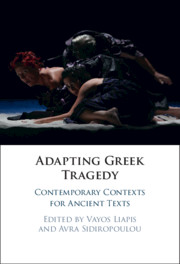Introduction
Published online by Cambridge University Press: 12 March 2021
Summary
In the last decades of the twentieth century, and at the beginning of the twenty-first, adaptation has come to the forefront of theoretical debates about the limits (or lack thereof) of our engagement with the classical past. At the same time, the adaptive process takes on an increasingly performative character, moving away from the text-centred approaches that had dominated earlier eras and towards new idioms that privilege visuality at least as much as textuality, or enhance the text through its scenic realisations and refractions. Theorists are now careful not to ‘treat performance as merely a derivative citation of the text’;1 text and performance are viewed as being in a state of constant interaction, complementarity, and mutual redefinition, in which performance may actuate in numerous ways the performative potential of the dramatic text, while the text may be conceptualised afresh as a result of being performed. In particular, to study the adaptation of Greek tragedy in both textual and performance media is not only to explore intertextual or ‘intervisual’ relations but also to map out the various avenues through which plays once considered sacrosanct, qua indisputedly part of the Western cultural paradigm, are increasingly being appropriated into different performance and cultural contexts, value systems, and conceptual frames, and are as a result often challenged, questioned, contested.
- Type
- Chapter
- Information
- Adapting Greek TragedyContemporary Contexts for Ancient Texts, pp. 1 - 23Publisher: Cambridge University PressPrint publication year: 2021
- 1
- Cited by



